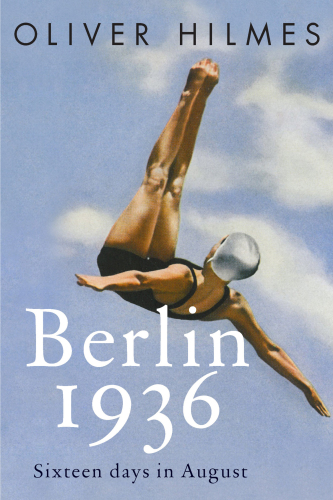
Berlin 1936
Fascism, Fear, and Triumph Set Against Hitler's Olympic Games
کتاب های مرتبط
- اطلاعات
- نقد و بررسی
- دیدگاه کاربران
نقد و بررسی

November 15, 2017
The drama and personal stories behind one of the most famous--and infamous--Olympic Games.Hitler's goal for the 1936 Berlin Games, as Hilmes (Malevolent Muse: The Life of Alma Mahler, 2015, etc.) writes, was "to give visitors a positive impression of the Third Reich using the Olympics as camouflage." The author uses this event--the book has 16 chapters, one for each day of competition--to show the extent of Hitler's deception and its effect on actors, nightclub owners, everyday Berliners, and others. Among the ordinary citizens are a woman with a secret so painful that, rather than confess to her husband, she stepped in front of a moving train and a transvestite so afraid of detection she would not leave her apartment to see a doctor and died from a burst artery. Among the celebrities are Richard Strauss, who disdained "sports foolishness" yet still composed an "Olympic Hymn"; Jesse Owens, the American track star whose four gold medals were, in Joseph Goebbels' view, "an affront to the idea of white supremacy"; Leni Riefenstahl, whose film about the Games gives "a seemingly objective picture of an open-minded, cosmopolitan and peaceful Germany"; and Thomas Wolfe, whose falsely sanitized view of Germany changed dramatically during the event. Though Hilmes bogs down the story with too many unnecessary details--e.g., the streets people live on, the clubs they frequent, weather forecasts--he still offers memorable sequences, from chillingly amusing (Hermann Goring appearing in public in a different uniform depending on which of his many appellations an occasion called for) to harrowing, such as that prisoners already in Nazi camps were "beaten with sticks and hung from hooks with their hands bound behind their backs" while athletes celebrated 40 minutes away.Thomas Mann, listening to the Games from exile in Switzerland, knew that Hitler's intent was "to intimidate, indeed overwhelm the rest of the world." This mostly illuminating book chronicles those efforts and suggests the horrors to come.
COPYRIGHT(2017) Kirkus Reviews, ALL RIGHTS RESERVED.

January 1, 2018
The legendary feats of Jesse Owens at the 1936 Berlin Olympics are one of numerous story lines in Hilmes's (Franz Liszt: Musician, Celebrity, Superstar) panorama of that fateful summer. Many of the characters who populate the Berlin venue, such as American author Thomas Wolfe, were already famous. Meanwhile, the circumstances of Peter Forhlich, a sports-obsessed child of Jewish descent, whose father managed to obtain tickets to the Olympic venue normally denied to Jews, gave little hint as to his later renown as the scholar Peter Gay--one of the foremost historians of European culture of his generation. Though Hilmes provides fascinating insight into the events, sounds, and even the weather of Berlin during those momentous 16 days, it is easy to get lost in the various narratives. Some individuals, such as the Berlin housewife who commits suicide, appear for only a paragraph; other anecdotes last for a few pages, while some figures, such as Wolfe, are continuing characters. Hilmes, however, does provide a beneficial "What become of..." epilog. Those interested in more detailed analysis should read Richard Mandell's Nazi Olympics. VERDICT A unique sports history recommended for all libraries.--Frederic Krome, Univ. of Cincinnati Clermont Coll.
Copyright 2018 Library Journal, LLC Used with permission.

Starred review from November 15, 2017
Among the throngs gathered for the 1936 Olympics in Germany, the American novelist Thomas Wolfe marveled at how the Nazi hosts had managed crowds with a quietness, order, and speed that was astounding. Probing behind the facade, Hilmes exposes the hidden human travail. Carrying readers to venues far from the fields of athletic competition, the richly detailed 16-day narrative spotlights men and women who receive no medals but who deserve empathetic attention: the nightclub owner Leon Henri Dajou, forced to flee Berlin when the gestapo uncovers his Jewish roots; the musical genius Mitja Nikisch, completing a pathos-filled concerto just before he dies; jazz saxophonist Teddy Stauffer, injecting the daring thrill of officially forbidden rhythms into Berlin nightlife. Naturally, readers do witness the triumphs and frustrations of the Olympic competitorsincluding, especially, Jesse Owens, the gifted African American track star who deflated the Nazis' Aryan-supremacy theme with his four gold medals; and Luz Long, the German broad jumper who incurred the gestapo's wrath for embracing Owens. With the skill of a novelist, Hilmes weaves into his account the menacing presence of Hitler, deviously staging the Games to deceive a global audience unaware of the horrific evils he is about to unleash. A riveting drama.(Reprinted with permission of Booklist, copyright 2017, American Library Association.)

























دیدگاه کاربران